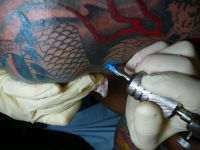
Tattoo studio
Encyclopedia

Tattoo
A tattoo is made by inserting indelible ink into the dermis layer of the skin to change the pigment. Tattoos on humans are a type of body modification, and tattoos on other animals are most commonly used for identification purposes...
s from a tattoo artist.
The properly equipped tattoo studio will use biohazard
Biological hazard
Biological hazards, refer to biological substances that pose a threat to the health of living organisms, primarily that of humans. This can include medical waste or samples of a microorganism, virus or toxin that can impact human health. It can also include substances harmful to animals...
containers for objects that have come into contact with blood or bodily fluids, sharps container
Sharps container
A sharps container is a container that is filled with used medical needles . They fit into two main types:* single use which are disposed of with the waste inside,...
s for old needles, and an autoclave
Autoclave
An autoclave is an instrument used to sterilize equipment and supplies by subjecting them to high pressure saturated steam at 121 °C for around 15–20 minutes depending on the size of the load and the contents. It was invented by Charles Chamberland in 1879, although a precursor known as the...
for sterilizing tools. Certain jurisdictions also require studios by law to have a sink in the work area supplied with both hot and cold water.
Proper hygiene requires a body modification artist to wash his or her hands before starting to prepare a client for the stencil, between clients, and at any other time where cross contamination
Cross Contamination
Cross Contamination is an album by the rock bands Batmobile and Peter Pan Speedrock. It was released in 2008 by Suburban Records.-Track listing:#"Hellalujah"#"Go Satan Go"#"Killerspeed"#"Big Toy"#"Straight Back To Hormoneville"#"Transsylvanian Express"...
can occur. The use of single use disposable gloves is also mandatory. In some states and countries it is illegal to tattoo a minor even with parental consent, and it is usually not allowed to tattoo impaired persons, people with contraindicated skin conditions, those who are pregnant or nursing, or those incapable of consent due to mental incapacity. Before the tattooing begins the client is asked to approve the position of the applied stencil. After approval is given the artist will open new, sterile needle packages in front of the client, and always use new, sterile or sterile disposable instruments and supplies, and fresh ink for each session (loaded into disposable ink caps which are discarded after each client). Also, all areas which may be touched with contaminated gloves will be wrapped in clear plastic to prevent cross-contamination. Equipment that cannot be autoclaved (such as countertops, machines, and furniture) will be wiped with an approved disinfectant.
Membership in professional organizations, or certificates of appreciation/achievement, generally helps artists to be aware of the latest trends. However, many of the most notable tattooists do not belong to any association. While specific requirements to become a tattooist vary between jurisdictions, many mandate only formal training in bloodborne pathogens, and cross contamination. The local department of health regulates tattoo studios in many jurisdictions.
For example, according to the health department in Oregon and Hawaii, tattoo artists in these states are required to take and pass a test ascertaining their knowledge of health and safety precautions, as well as the current state regulations. Performing a tattoo in Oregon state without a proper and current license or in an unlicensed facility is considered a felony offense. Tattooing was legalized in New York City, Massachusetts, and Oklahoma between 2002 and 2006.
Tattooers may use flash (pre-drawn, stock images that can be traced onto the skin) or create original tattoos for their customers.

